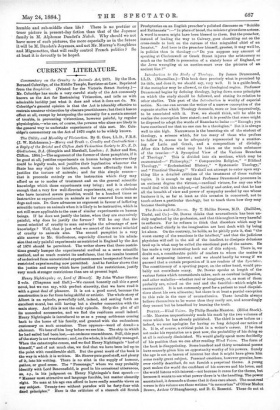Henry Nightingale; or, Lord of Himself. By John Walter Sharer.
S vole. (Chapman and Hall.)—We cannot honestly call this a good novel, but we can say, with perfect sincerity, that we have read it with a great deal of pleasure. It is not a good novel, because the construction is so far from being skilful or artistic. The whole story of Albert is an episode, powerfully told, indeed, and setting forth an excellent moral, but still having but a slender connection with the main story. And this is not the only episode. Strip the plot of all its unneeded accessories, and we find the residuum small indeed. Henry Nightingale is introduced to us as a young nobleman coming back to the home of his family, and greeted with the enthusiasm customary on such occasions. Then appears—word of dread—a claimant. We hear of him long before we see him. The ship in which he had sailed had been lost,—an ominous resemblance. Still, this part of the story is not wearisome; and, on the whole, it is skilfully managed. When the catastrophe comes, and we find Henry Nightingale "lord of himself," and of not much else, we find that we have been led up to the point with considerable skill. But the great merit of the book is the way in which it is written. Mr. Sherer puts good stuff, and plenty of it, into his writing. There is no stint in the supply of humour, pathos, or good sense. The "Personage," whom we may probably identify with Lord Beaconsfield, is good in his occasional utterances, as, e.g., in his judgment on Henry Nightingale's first speech :- "Manner moat attractive and language forcible, but matter absurdly right. No man at his age can afford to have really sensible views on any subject. Twenty-two without paradox will be forty-four with deed principles." Here is the criticism of a staunch old Scotch Presbyterian on an English preacher's polished discourse on "Suicide and Euthanasia" :—" In place of bread, the minister gives them a stone. A word in season might have been blessed to them. Bat the preacher, instead of leading the way to Calvary, goes shambling out on the cross-roads to look on the carcase of that misguided chiel of an Iscariot." And here is the preacher himself, greater, it may well be, in politics than in theology :—" Do you suppose any amount of spouting at Clerkenwell or Greek Street injures the aristocracy so much as the bailiffs in possession of a stately home of England, or the Jews wrangling at an auction-mart over the pictures of an ancient line ?"
































 Previous page
Previous page